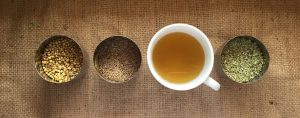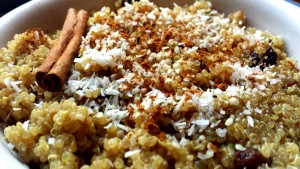 According to Ayurveda, a healthy digestive fire (Agni) is the key to your entire health and well-being. Alternatively, the root cause of toxins and disease is improper digestion. I am a firm believer in this theory and have seen it firsthand throughout my practice. The causes and symptoms of each individual’s digestive issues may vary, but the one thing that seems to be universal is that your digestion must be restored in order to prevent and/or treat any disorder.
According to Ayurveda, a healthy digestive fire (Agni) is the key to your entire health and well-being. Alternatively, the root cause of toxins and disease is improper digestion. I am a firm believer in this theory and have seen it firsthand throughout my practice. The causes and symptoms of each individual’s digestive issues may vary, but the one thing that seems to be universal is that your digestion must be restored in order to prevent and/or treat any disorder.
Before going on, it is important to first establish what your digestive issues exactly are. This may be very obvious to some, while others may be experiencing more subtle symptoms of indigestion. Here is a list of some common improper digestive symptoms to look out for. The more severe your symptom(s), the more severe your issue will be. Similarly, if you are checking off multiple symptoms listed, this is another indicator that action is needed and fast!
Common Symptoms of Digestive Imbalances
- Gas, bloating, cramping, and/or gurgling
- Constipation
- Diarrhea or chronic loose stools
- Heaviness or sleepiness after food
- Slow metabolism
- Lack of appetite
- Coating on the tongue
- Bad breath
- Teeth marks around the perimeter of the tongue (or other symptoms of malabsorption)
- Acid reflux or heartburn
- Inflammation in the GI tract (e.g. gastritis, Crohn’s, ulcerative colitis, etc)
- Hyper-metabolism, excessively hungry
- General feelings of heaviness and lethargy
- Dull, foggy mind
- Aches and pains throughout the body or at the root of the hair
- Poor circulation
- Weakened immunity
Improper digestion is one of the main causes of toxins (which will further hamper digestion and metabolism), weight gain, reduced energy levels, mental fog and fatigue, accelerated aging, and all disorder and disease. There is an unlimited amount of causes for digestive issues, however, here are some common causes to look out for… and remember the first step in any treatment program is to remove the cause!
Common Causes of Digestive Imbalance
- Emotional imbalances (anxiety, worry, fear, depression, anger, etc)
- Stress
- Improper food combining
- Eating allergenic foods (e.g. dairy, wheat, gluten, soy, sugar, etc)
- Eating too late at night
- Constant grazing, excessive snacking
- Poor dietary choices
- Sleeping or lying down after food
- Eating on the go
- Gut flora imbalance (dysbiosis)
- Yeast infection or Candida
- Parasitical infection
- Overeating
- Improper lifestyle habits
- Lack of sleep
So now that you have an idea of both the causes and symptoms of improper digestion, let’s begin this 28-day journey for restoring a healthy and robust digestive fire.
Each week (for the next four weeks) we will establish:
- Foods to eliminate (meaning 100% gone)
- Foods to limit
- Foods to favor
- Ayurvedic dietary tip of the week
- Daily routine practice of the week
- Herbal regimen of the week
- Suggested recipe ideas
*Please note that each week we will be adding new recommendations. However, all of the previous recommendations should still be in effect throughout the entire program (and hopefully beyond)!
Healthy Digestion Challenge: WEEK 1
Click her for a PDF copy of this chart.
Ayurvedic Dietary Tip of the Week
 Eat your largest meal mid-day.
Eat your largest meal mid-day.
Your digestive fire, like the sun, is at its strongest point between the hours of 11 am and 1 pm. Therefore eating your biggest meal at this time will allow for better digestion with a larger meal. Eating a larger meal mid-day will help to sustain both your hunger and your appetite for the second half of the day when energy tends to wane.
Since your digestive fire is at its strongest point mid-day, meat, dairy, and other heavy, hard-to-digest foods should be taken at this time only. This means that your dinner meal should be lighter both in quantity (meaning smaller amount) as well as quality (meaning lighter food types).
Daily Routine Practice of the Week
 Drink a cup of hot water each morning upon awakening.
Drink a cup of hot water each morning upon awakening.
This simple, yet powerful, addition to your daily routine possesses multiple health benefits for your digestion and beyond. Drinking a cup of hot water each morning (before you take in any other food or drink) will help to gently flush your system while awakening your vital digestive organs for the day. It reduces the dehydration that naturally sets in from a long night of sleep, and it will help promote a healthy morning bowel movement. For extra health benefits, you can add in a squeeze of fresh lemon (best for Kapha and Vata) or fresh lime (best for Pitta).
Read our full article on 7 reasons to begin your day with hot water!
Herbal Regimen of the Week
 CCF Tea*
CCF Tea*
CCF Tea stands for Cumin, Coriander, and Fennel respectively. When combined, these three savory spices make for a powerful digestive aid when consumed between meals. While increasing your digestive fire, this tea blend will also work to gently flush toxins from your system. To make this herbal tonic even greater, it is very balanced and can be used by all dosha types, and is beneficial for petty much all digestive disorders. However, if you are experiencing hyperacidity, you may have to reduce the amount of cumin in the recipe. Otherwise, it can be made as recommended, and taken as much as needed.
*CCF Tea can be replaced by my Detox Tea for potent results!
Directions: Make a large batch of CCF Tea each morning. Drink 1 cup mid-morning (between breakfast and lunch), 1 cup mid-day (between lunch and dinner), and 1 cup before bed (at least 1-hour post-meal).
Click here for our complete CCF Tea recipe.
Week One Recap

Click here for a PDF copy of this chart.
Recipe Suggestions of the Week
 Tri-doshic Mung Dahl and Quinoa Kitchari Recipe
Tri-doshic Mung Dahl and Quinoa Kitchari Recipe
Kitchari is typically a “soup” of mung beans and basmati rice that is considered very balanced, highly nutritious, and easy to digest. It is often eaten as the only food during Ayurvedic cleanses and will sustain your energy and nutrient levels while giving your digestive fire a much-needed rest.
This particular kitchari recipe is considered “tri-doshic” meaning it is can be eaten by all body types. It replaces the traditional basmati rice with whole-grain quinoa which tends to be lighter in quality, less sticky, and contains a much higher nutrient content (especially protein and fiber!). This recipe can be a staple recipe for your entire Healthy Digestion Challenge and longer if desired. Click here for the full recipe!
 Simply Spiced Quinoa Porridge Recipe
Simply Spiced Quinoa Porridge Recipe
Our Simply Spiced Quinoa Porridge recipe is a twist on your typical oatmeal breakfast, which may leave you heavy and tired. By using whole grain quinoa, you will obtain a high fiber content along with a decent dose of complete protein (meaning it contains all of the essential amino acids), without the heaviness that often accompanies starchier grains. This recipe includes many sweet, aromatic digestive breakfast spices which will awaken your digestion and help you start your day off right. Click here for the full recipe!
 Sweet Potato, Kale, and Brown Rice Scramble
Sweet Potato, Kale, and Brown Rice Scramble
Here is a recipe a bit more hearty than the previous two. It is tasty, filling, and nourishing while still remaining healthy and packed with essential vitamins and nutrients. If brown rice isn’t your cup of tea, you can always replace it with a lighter grain such as quinoa or millet. Click here for the full recipe!
Continue Reading
-
28 Days to a Healthier Digestion Challenge: Week Two
-
28 Days to a Healthier Digestion Challenge: Week Three
-
28 Days to a Healthier Digestion Challenge: Week Four
-
28 Days to a Healthier Digestion Challenge: Week Five
Compliment your cleanse with Detox Tea!
Discover more healing recipes with my 30-Minute Ayurvedic Cookbook!






Classical explanation. Very important to enjoy healthy living
Hi Sushil,
Thank you for writing in with your kind words. I hope you can find this information useful. Please let me know if you have any questions and I will be happy to help!
Be well:)
Namaste,
Danielle